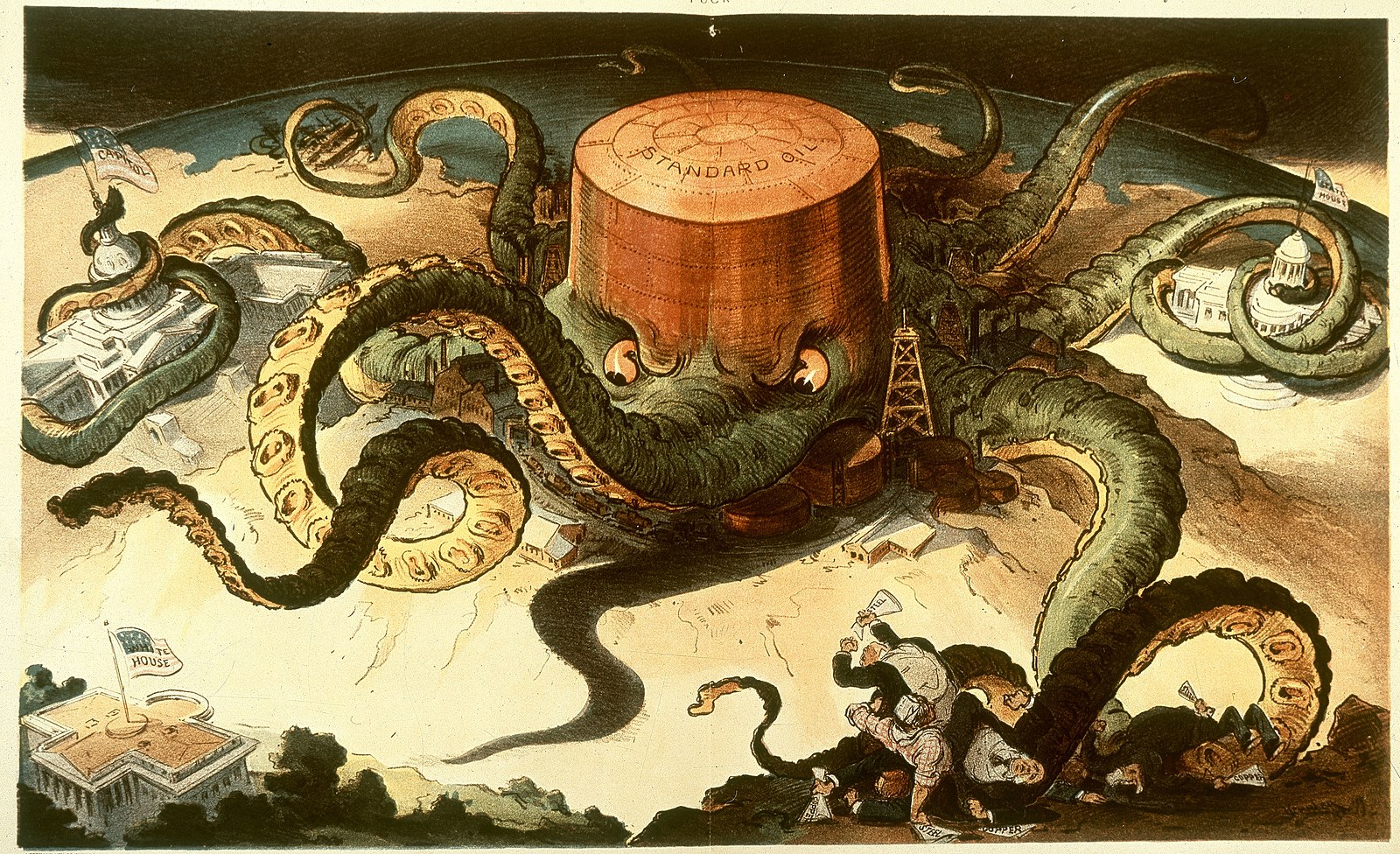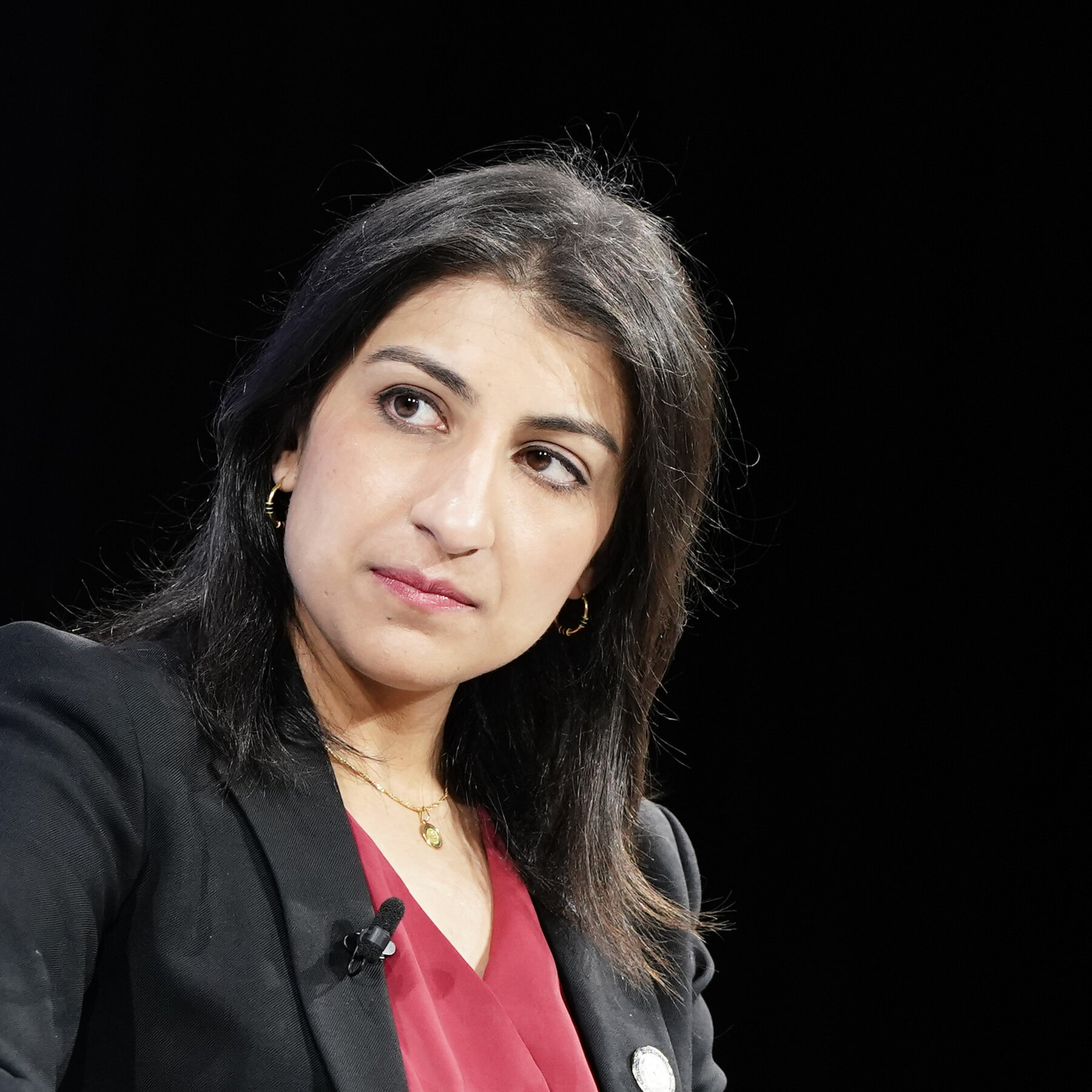A Historical Perspective on the Regulation of Monopolies in the The United States
Written by Laila Echerfaoui
This year, Professor Michael D.Whinston was awarded the Jean-Jacques Laffont Prize for his significant work on antitrust laws and his involvement in the Google monopoly case. After going through his main publications, news reports about him, and videos on the Google case, I started wondering: why are monopolies so hard to dismantle in the U.S. Why are companies allowed to become monopolies and dominate markets?
A brief reminder might be useful: a monopoly is a market with the absence of competition, which creates a situation where a company is the only supplier of a particular good or service. The first well-known monopoly in the U.S. was Standard Oil, created by John Davison Rockefeller in 1882, which became the main supplier of oil in the USA.

Early Anti-Monopoly Legislation
"The power that controls the economy should be in the hands of elected representatives of the people, not the industrial oligarchy"
Justice William Douglas
1948
Expressing a common fear that monopolies put too much power into the hands of a few. Monopolies were already a cause for concern in 1890 when the Sherman Antitrust Act was passed. It was the first law aimed at breaking up monopolies and business structures, the latter representing multiple companies or assets that are managed by a single board.. For instance, the first section of this law sums up effectively the spirit of this act: "Every contract, combination in the form of trust or otherwise, or conspiracy, in restraint of trade or commerce among the several states, or with foreign nations, is hereby declared illegal".
Following this first attempt at regulating monopolies in the U.S., the 1962 case Brown Shoe Co. v. United States made a harsh ruling..
The merger of shoe retailers that had only a 5% share of the shoe market was prevented to protect small businesses, despite the lack of significant market power. This law forced Standard Oil to split into 34 smaller companies, which surprisingly increased their global value and made Rockefeller wealthier.
This case illustrates the fact that monopolies aim for power, not just profit.
Then, in 1914, the Clayton Antitrust Act was passed, adding further substance to the U.S. antitrust law regime. Section 7 “prohibits mergers where the effect of such acquisition may be substantially to lessen competition, or tend to create a monopoly in any line of commerce.” This shows fewer restrictions than the Sherman Act, which prohibited trusts from even existing.
“Testifying was close to teaching: you are teaching the judge”
Professor Michael D. Whinston
“This experience was both similar and different from my academic work. It was similar because I had to understand the economics behind Google’s business and strategy by combining theory and evidence. I had to understand what drives their business decisions. So, I analyzed a lot of internal documents and data. In fact, in this case there was a tremendous amount of data! Using economics, the goal is to structure all this evidence to have a clear story about what happened. What was also similar to academics is that testifying is close to teaching. In this case, you are teaching the judge. In fact, in the U.S we are in front of an unspecialized judge which is different from Europe where there is an administrative and legal body specialized in antitrust. In this case, Judge A. Mehta was very impressive: although it was only its second antitrust case, he really wanted to rightly and deeply understand the industry, Google’s conduct, and its effects.
However, the main difference from academics was the legal process. It can be quite stressful. For example, when there is a cross examination, the lawyers on the other side are mainly interested in tearing you and your argument apart rather than in learning. Hopefully, that is not something that happens in the academic world!”
The Influence Of Corporations On Legislation
Yet, although several laws put the United States in a path towards maintaining a firm grip on monopolies, captains of industry found ways to bypass these regulations. J.D. Rockefeller, the owner of Standard Oil, was a big donor to the University of Chicago, giving 35 million dollars to develop the Chicago School of Thought. The Chicago School was and still is very influential and promotes the idea that the market regulates itself with little to no need for the government.
Other organizations like the Cato Institute, created by Charles Koch -heir of Koch Industries in 1977- and the Heritage Foundation, founded in 1973, were also established to promote these liberal ideas, opposing government intervention in the market. As a matter of fact, in 1981, the Heritage Foundation published the first book, with 2,000 proposals, of a series called “Mandate for Leadership”. Approximately 60% of these proposals were implemented or initiated by the end of Reagan's first year in office, thus displaying the strong influence of these institutions, with ideas that influenced even the White House.
A further shift took place in the 1970s, when legal scholar Robert Bork forced a change in the aim of the anti-trust legislation, shifting the focus from protecting citizens to consumer welfare. That indicated that a monopoly can exist as long as the consumer doesn’t suffer from higher prices. This new point of view was criticized by many economists like M. Whinston or lawyers like Joseph E. Fortenberry.
On top of these influential think-tanks and academics, some seminars were set up to impart ideas about weakening the U.S. antitrust legislation.

“By 1990, approximately forty percent of the sitting federal judges had completed Manne's flagship program Economics Institute for Federal Judges.”
Henry N. Butler
The Manne Programs in Economics for Federal Judges (Case Western Reserve Law Review, Volume 50, Issue 2, 1999)
The Manne Program was an educational program in economics for federal judges funded by the John M. Olin Foundation, a conservative American grant-making foundation established in 1953. His founder, John M. Olin, was the president of the Olin Industries as well as chemical and munitions manufacturing businesses. The paper “Ideas Have Consequences: The Impact of Law and Economics on American Justice”, published in 2022 by the economists E. Ash, D. Chen, and S. Naidu, states that the judges who went to the Manne flagship program were way more conservative than the ones who didn’t go.
The role of politics in antitrust legislation
Antitrust laws are also influenced by politics. Generally, right-wing parties are less strict on monopolies, while left-wing parties favour stricter regulations. During Ronald Reagan's presidency, only 0.7% of mergers were challenged, compared to 2.5% under Democratic President Carter. However, Barack Obama’s administration allowed the merger of Live Nation and TicketMaster, which is now being investigated for monopolistic practices, as Live Nation controls about 80% of major concert ticketing. Yet, under the Biden administration, a new era of ruthless challenges against monopolies arrived when Lina Khan became the chair of the Federal Trade Commission (FTC). She has already taken Google to court for monopolistic practices and is suing companies for making it difficult for consumers to cancel their subscriptions. Her policies, which are characterized by a modern view on Americans’ everyday problems, have been popular on both sides of the political spectrum. Yet, we can see again the limits of antitrust legislation with big donors like Mark Cuban, a multi-billionaire who suggested firing Lina Khan if Kamala Haris wins.

Conclusion
All in all, anti-trust legislation has evolved hand in hand with the development of new economic models that assess the potential risks of merging. Today, analyses of the many potential monopolies are more empirical than theoretical, bringing us as close as possible to reality. It would be more desirable if academia and judges worked independently, without companies influencing the decision-making process.

Norwegian Mobility: Between Sustainability and long-distance challenges
By: Rappenne Maëlys
Norway and Scandinavia are often viewed as models concerning the environment and sustainability actions. Oslo, Norway’s capital, was awarded the European Green Capital Award 2019. Since 2010, this title has been given by the European Commission to cities based on recent progress, current status, and future plans...
The Rise of Chinese Electric Vehicles in Europe : An Eco-nomic Analysis of Challenges and the EU’s Response
By: Blanchard Mathis
The rapid ascent of Chinese electric vehicle (EV) manufacturers is intensifying trade tensions with both the United States and the European Union. In June 2024, the European Commission imposed provisional countervailing duties ranging from 17.4% to 38.1% on EVs imported from China...
Airbus Vs Boeing: A historical duopoly
By: Tazi Narjis
The early 1970s saw the creation of Airbus, a symbol of Franco-German cooperation at first, then European collaboration with the arrival of Spain and the United Kingdom. The creation of Airbus was a response to the dominance of American aircraft manufacturers in the post-World War II aviation market. Despite a difficult start the 1980s saw the beginning of a breakthrough for Airbus, with the introduction of the A310 and then the A320. In the 1990s...
A new (temporary) wall in the heart of the Schengen Area
By: Mondelli Martin
On September the 16th 2024 Europe woke up with an unusual piece of news: international borders were reintroduced in Germany. Even though some citizens were not expecting this to happen anytime soon, for Swiss, Austrians, Czechs and Poles this situation was not new. In fact, border controls that were introduced on October the 16th 2023 are still in place...


